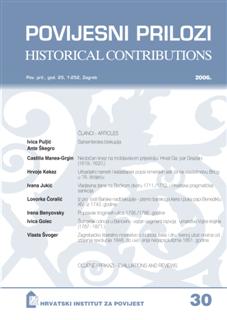Zagrebačko liberalno novinstvo o slobodi tiska i društvenoj ulozi novina od izbijanja revolucije 1848. do uvođenja neoapsolutizma 1851. godine
Zagreb liberal publications about the freedom of press and the social role of newspapers in the period between the revolution of 1848 and introduction
Author(s): Vlasta ŠvogerSubject(s): History
Published by: Hrvatski institut za povijest
Keywords: Zagreb liberal press; Saborske novine; Slavenski Jug; Südslawische Zeitung; Jugoslavenske novine; Novine dalmatinsko-hèrvatsko-slavonske; Agramer Zeitung; freedom of press; liberalism; public media; revolution 1848-1849; neo-absolutism
Summary/Abstract: Author analyzes attitudes of Zagreb liberal newspapers (Saborske novine, Slavenski Jug, Südslawische Zeitung, Jugoslavenske novine, Novine dalmatinsko-hèrvatskoslavonske i Agramer Zeitung) towards freedom of press and the role of newspapers as a public media, until these newspapers openly started to support the politics of the Austrian government. The circle and the readers of these publications considered freedom of press as a natural and predetermined human right, and associated it with the freedom of speech and thought. Editorial boards of these newspapers thought that unconditional freedom of press was not possible, relating this with the impossibility of the unlimited freedom of each person. However, these boards did not have consistent thrust about the legislative regulation on the matter of the freedom of press. Editorial boards of Agramer Zeitung, Südslawische Zeitung, and Jugoslavenske novine propped up legalization that would protect press from any pressure whether it came from authorities or public. On the other hand, editorial boards of Novine dalmatinsko-hèrvatsko-slavonske and Slavenski Jug opposed the any formal legalization, since they considered that freedom of press is regulated by civil and criminal law. All the aforementioned editorial boards were aware of the complexity of the problem and importance of the newspapers as public media of the contemporary society (regarding the public opinion, education, political rights and obligations of an each individual etc.). This attitude and awareness is visible from the topics of the articles published in the newspapers, as well as from the fact that they acted as vox populi. Though they were aware of the possible misuse of newspapers and public media, they thought that their positive role was more important and had grater impact on the society.
Journal: Povijesni prilozi
- Issue Year: 2006
- Issue No: 30
- Page Range: 203-223
- Page Count: 21
- Language: Croatian

